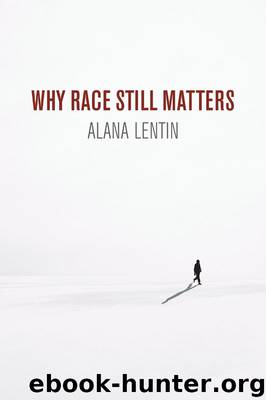Why Race Still Matters by Alana Lentin

Author:Alana Lentin [Lentin, Alana]
Language: eng
Format: epub
Publisher: Wiley
Published: 2019-07-11T00:00:00+00:00
Indeed, a conflation of indigeneity with race has been at the heart of the evasion of material redress for racial-colonial rule in the settler colonial states and an erosion of hard-fought Indigenous political autonomy. In order to access a modicum of rights, Indigenous people have often been reduced to essentialized palimpsests of their past and forced to perform a cultural authenticity that in fact has been lost to many as a result of colonial dispossession. In Australia, the insertion of Aboriginal and Torres Strait Islander people into a multiculturalist framework means that it is very difficult in practice to attain the land rights enshrined in law by the 1993 Native Title Act. Communities litigating for rights to their ancestral lands are judged on whether or not they are able to demonstrate attachment to Aboriginal cultural practices, which in reality have been eroded by genocide, forced relocations, the mission system, and the theft of Aboriginal children under a policy of assimilation and racial ‘improvement’ (Moreton-Robinson 2015; Povinelli 2007; Wolfe 2016). On the flipside, child protection agencies are seen as hamstrung by so-called ‘cultural baggage’ when it comes to the protection of at-risk Aboriginal children. In reality, more Aboriginal children are being removed from their families today than at any other time in Australian history, often immediately after birth (Wahlquist 2018). In one public pronouncement on the dysfunction of Aboriginal families, social workers were described as being ‘pressured to be “culturally appropriate”… “to the detriment of Aboriginal children”’ (Bond 2018). These practices of racial rule are predicated on the still common belief that Indigenous cultures are not fit for the purposes of modern life. Indigenous demands for sovereignty thus centre on the right to a family life as well as the right to land.
Asad Haider, however, does not seem to have engaged with the writings of Indigenous scholars and activists on these and other topics. In Mistaken Identity, he conflates Indigenous sovereignty claims with the essentialist identitarianism of the ‘race first’ approach he claims to have witnessed at the UC Santa Cruz occupation. Haider could not fathom students’ opposition to ‘the very words occupy or occupation’ (Haider 2018a: 33, emphasis in original; see also Kauanui 2016). The reduction of the term to ‘celebrating the genocide of Indigenous people’ was a ‘stunning reversal of earlier academic fads’, he claims (2018a: 33), although he does not elaborate on what these ‘fads’ were. Haider himself notes the 2011 Occupy movement’s general failure to adequately address race because of its inability to ‘take hold in the poorest neighborhoods’ and ‘diversify its ranks adequately’ (2018a: 29). Therefore, his resistance to Indigenous people’s objections to the meaning of Occupy are concerning. In fact, he compartmentalizes issues in exactly the same way that he accuses others of doing when they retreat into rigid identities by failing to consider Eve Tuck and K. Wayne Yang’s insistence that,
for many Indigenous people, Occupy is another settler re-occupation on stolen land. … The pursuit of worker rights (and rights to work) and minoritized
Download
This site does not store any files on its server. We only index and link to content provided by other sites. Please contact the content providers to delete copyright contents if any and email us, we'll remove relevant links or contents immediately.
Cecilia; Or, Memoirs of an Heiress — Volume 1 by Fanny Burney(31332)
Cecilia; Or, Memoirs of an Heiress — Volume 3 by Fanny Burney(30934)
Cecilia; Or, Memoirs of an Heiress — Volume 2 by Fanny Burney(30889)
The Great Music City by Andrea Baker(21283)
We're Going to Need More Wine by Gabrielle Union(18072)
Bombshells: Glamour Girls of a Lifetime by Sullivan Steve(13108)
Pimp by Iceberg Slim(12931)
All the Missing Girls by Megan Miranda(12747)
Fifty Shades Freed by E L James(12449)
Norse Mythology by Gaiman Neil(11882)
Talking to Strangers by Malcolm Gladwell(11875)
Crazy Rich Asians by Kevin Kwan(8349)
Mindhunter: Inside the FBI's Elite Serial Crime Unit by John E. Douglas & Mark Olshaker(7833)
The Lost Art of Listening by Michael P. Nichols(6472)
Enlightenment Now: The Case for Reason, Science, Humanism, and Progress by Steven Pinker(6405)
Bad Blood by John Carreyrou(5768)
The Four Agreements by Don Miguel Ruiz(5510)
Weapons of Math Destruction by Cathy O'Neil(5036)
We Need to Talk by Celeste Headlee(4868)
